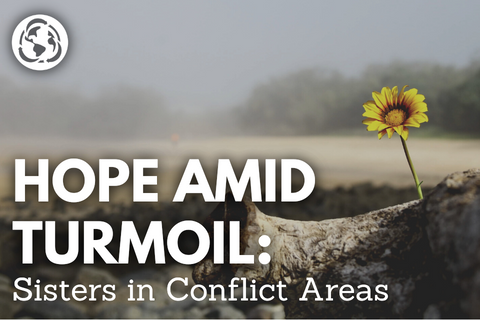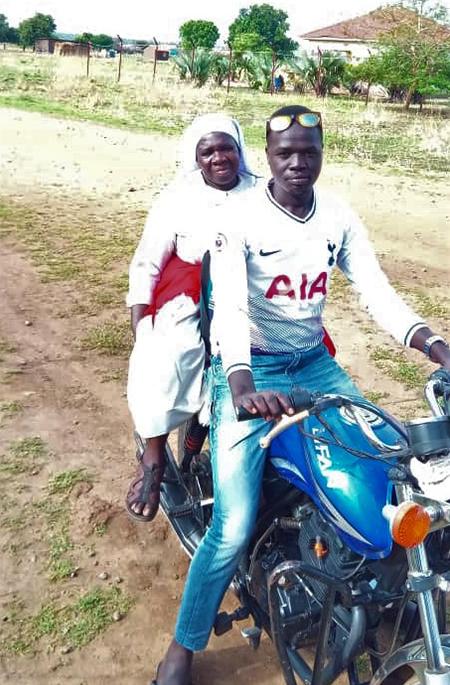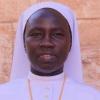
The sun rises Feb. 5 in Juba, South Sudan. (CNS/Paul Haring)
Editor's note: Global Sisters Report's new series, Hope Amid Turmoil: Sisters in Conflict Areas, offers a look at the lives and ministries of women religious serving in dangerous places worldwide. The news stories, columns and Q&As in this series will include sisters in Ukraine, Nigeria, Kenya, Sri Lanka, Nicaragua and more throughout 2023.
My observation is that, generally, sisters in Eastern Africa are steadily responding to the cry of the poor. With the publication of the Laudato Si' encyclical of Pope Francis, sisters accelerated their advocacy drive and responses to the cry of the poor, propelled by both the Laudato Sí Action Platform, and the demands of Justice, Peace and Integrity of Creation, or JPIC, at national and regional levels.
Sacred Heart Sr. Mary Atimango and her team are setting out to bring healing to the fragile political state of South Sudan. Although the young nation has its sociopolitical instabilities, it has registered great milestones in peace initiatives, which continue today. Justice, Peace and Integrity of Creation and collaborators continue to promote human dignity and respect for God's creation in the region.

A remarkable success in South Sudan started when 14 sisters from different congregations made the Nonviolence Training of Trainers with Pax Christi International, October 2022 in Juba. These sisters went out to train different groups of people, especially those susceptible to violent tendencies such as the youth, the girl-child school dropouts, street children, boda-boda riders (hired motorcyclists), candidates in formation houses, and learners at all levels of education.
As in the saying, "Be the agent of the change that you want to see tomorrow," Sister Mary found the task strongly linked with issues of justice and peace. "In Juba Archdiocese, the consecrated women were not involved in JPIC; this is the first time they are involved," she observed.
Sister Mary approached candidates in formation houses, pupils and students in both primary and secondary schools, and street boys and girls, including a group who kill people using machetes (pangas). "I managed to train over 189 of such people and [am] still in position to meet more groups," Atimango said.
Atimango, who doubles as assistant head teacher, has worked in South Sudan for almost two years. She met with 87 pupils in primary school and primarily targeted the inculcation of values. "The learners knew peace icons like Nelson Mandela of South Africa and Mahatma Gandhi of India, an indication that these pupils knew that peace is possible without violence," she noted.
She also chose 68 secondary school students, considered young adults because they could distinguish between good and bad. Having had a previous training in peace building, their response was warm and enthusiastic, and nonviolence training was not new to them. Surprisingly, the administration of both primary and secondary schools supported the program because the learners would acquire skills of peaceful coexistence.

Sr. Mary Atimango, ready to reach out to participants of the nonviolence program (Courtesy of Mary Atimango)
A bit nervous, but courageous, Sister Mary met 16 boys and girls from the toughest street gang. They were skeptical with her at first, but later opened up. "So far we have seven meetings with this group, feared most in the local community. Surprisingly, their numbers increased each time we met. We have bonded well with them and they are very free to share anything with me!" Atimango exclaimed. Most of the tough gang members confessed that they resorted to criminal activities because of joblessness. Another one commented that the nonviolent communication training was helpful, and asked Sister Mary's permission to invite other friends to join the training.
Sister Mary said that the gang members keep calling her — and more surprisingly — some of them invited their parents to attend the nonviolence training. She received an overwhelming response from the parents who appreciated the invitation and feel joy for what the "new teaching" has done to their children! She enthusiastically revealed that she is organizing a big event for the parents, and said it was a big achievement for her.
The gang members surprised Sister Mary when they said, "You are the only person who cares about us, and nobody comes to us to say good things like you do! Will you come again? We want you to come again."
Advertisement
Atimango is calling for more sisters trained at the national level in order to engage in forming more youth as potential change-makers in nonviolence. She recommends training target groups in income-generating projects, to discourage idleness and equip them with life skills to protect them from criminal activities like stealing, drug abuse and murder.
However, a big challenge she faces is a lack of transport to get people to the workshops. It is hard to get the target groups to sessions, especially the gang members who are initially skeptical about being exposed to the new ideas.
Some of the older children have expressed interest in vocational training where they can acquire hands-on skills, but the sisters cannot afford to sponsor such trainings. Sr. Mary Atimango also recommends that in order to have an impact, parents of the youth should be trained in nonviolence skills. They would learn how to solve domestic problems amicably through negotiations, conflict management skills, reconciliation and how to use the tools for peace building at home, rather than infamous child abuse.
And remember that tough gang that killed people with machetes? They changed their name from a derogatory term to "St. Paul Youth." Conversion at work!
Such persistent initiatives are needed in Africa much more than ever. People — including politicians — trust and confide in sisters. Let us use this God-given opportunity to bring light to the continent of Africa.





